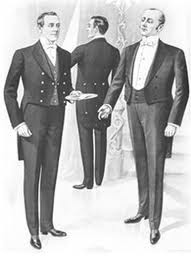 In fiction about the 19th century, you see them everywhere: they’re carrying tea trays, opening doors, serving dinner, or wandering about decoratively at balls wearing powdered wigs and knee-breeches with silk stockings. I’m referring, of course, to footmen.
In fiction about the 19th century, you see them everywhere: they’re carrying tea trays, opening doors, serving dinner, or wandering about decoratively at balls wearing powdered wigs and knee-breeches with silk stockings. I’m referring, of course, to footmen.Footmen were the main type of indoor male servant: any household with any pretension to gentility kept at least one footman. Do you remember, in Pride and Prejudice, how Lady Catherine de Bourgh is surprised to hear that Lizzie’s uncle keeps a manservant? A footman cost much more to maintain than a maid, though many of their duties could and did overlap: a footman earned more, and was generally supplied with a few different uniforms (called ‘livery’) for different occasions, which could be expensive.
So what did a footman do? His duties might vary from household to household, according to The Complete Servant, first published in 1825, but the basic ones were listed as the cleaning of knives, shoes, plate (silver), lamps, and furniture; the laying and replenishing of fires, answering the door, going on errands, waiting at table, and answering the parlor bell. A footman rose early to get a head-start on these duties, because he would be expected to set the table for, and serve breakfast for his employers. After tidying up the breakfast parlor, he might be sent out to deliver notes and invitations, then be back to finish any tasks he hadn’t already, and then perhaps be ready to accompany the lady of the family while she paid calls—it was the footman’s job to do the actual delivery of calling cards—or accompany her while shopping to carry parcels and open doors. Here’s a delicious bit from The Complete Servant: “In going out with the carriage, the footman should be dressed in his best livery, his shoes and stockings being very clean, and his hat, great coat, &c. being very well brushed; nothing being so disgraceful as a slovenly exterior. He should be ready at receiving directions at the carriage door, and accurate in delivering them to the coachman, and though he may indicate the importance of his family by his style of knocking at a door, he ought to have some regard to the nerves of the family and the peace of the neighborhood.” Hmm—I wonder if they sometimes got a little carried away?
Then there would be setting the table for dinner and serving it under the butler’s watchful eye, sneaking down to the parlor while the family dined to make sure the fire was replenished, the lamps lit, and the sofa cushions plumped up. He helped the butler clean and put away any plate that was used at the meal, carried up the evening tea-tray (customary earlier in the century), made sure candlesticks were ready when family members were ready to retire up to bed.

Because they occupied such a public place in the household, good looks were definitely an asset to a footman, especially height—everyone wanted footmen who were at least six feet in height, because they looked so imposing when in dress livery—and a fine calf to the leg (ditto the dress livery, which usually included knee-breeches and silk stockings). In fact, ads in 19th century papers from footmen looking for positions generally included their height, so that potential employers could “match” them to existing staff members!
A footman’s career tended to be a short one, relatively speaking, as they often moved on: an ambitious footman might aspire to an underbutler’s or butler’s position some day, or perhaps to a valet’s. Or if he decided not to remain in service, he might open an inn or tavern. The heyday of the footman ended with the first world war, when most of them enlisted; it was a traumatic moment for some old-fashioned aristocrats to have maids serving at table rather than the imposing, liveried footmen they were used to.





4 comments:
I always try to indicate the importance of my family when I knock on a door. :-) (You do have to wonder what that means. Were they pounding extra loud if they served an MP? Or more quickly if their master was an earl???)
Fascinating info, Marissa!
Cara
Maybe they got creative wth rhythms, too?! :)
Also included in the footman's duties are scheming, smoking, and scheming more (if you live in Downton Abbey). Downton Abbey also does a great job of showing the changes brought by WWI and just how dreadful and shocking they were to the old, staid butler.
I've only seen the first season, QNPoohBear, but I'll bet it does--life truly did change forever as a result of the war.
Post a Comment